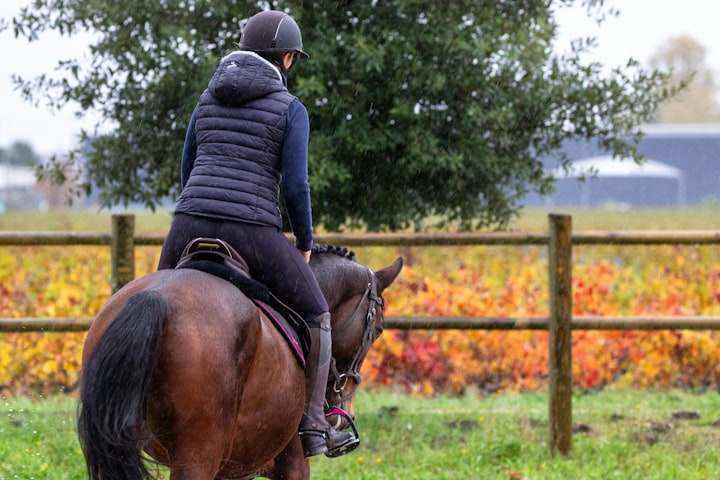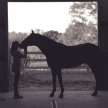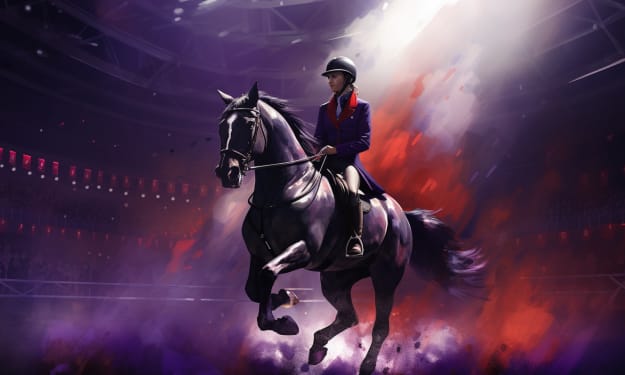The Rise of the Unqualified, Uninsured and Inexperienced Horse Trainers in the UK
Setting up a Facebook page and adding 'Your Name - Equine Services' isn't quite enough.

We've all seen them, most livery yards have one. They have decided they don't want to work a 9 to 5 anymore, and because they have given a few people's little kids a few lessons on their ponies, they now think they are a riding instructor.
It usually builds from there, they start riding people's horses, then it progresses to breaking youngsters and offerings 'schooling services'. Unfortunately, a lot of the people that they have as their clientele usually don't know any better.
Unfortunately, there are many unqualified horse trainers operating in the UK. Some of these trainers may be well-intentioned but simply lack the necessary training and experience. Others may be more interested in making money than in providing safe and effective training.
One way to identify an unqualified horse trainer is to look for the following red flags:
- The trainer does not have any formal qualifications in horse training.
- The trainer has very little experience training horses.
- The trainer is not insured.
- The trainer does not follow safety procedures.
If you see any of these red flags, it is best to avoid hiring the trainer. Instead, look for a trainer who has the necessary qualifications, experience, and insurance.
The equestrian industry in the UK is thriving, with a wide range of professionals dedicated to the health and well-being of horses. However, it is crucial for horse owners to be aware of the potential risks associated with hiring unqualified and inexperienced horse trainers. In recent years, there has been an alarming increase in individuals offering horse training services without the necessary qualifications, experience, and insurance. This trend not only poses a risk to the horses themselves but also compromises the safety and financial well-being of their owners.
The Importance of Qualifications and Registration
The Animal Health Professions' Register (AHPR), an organization committed to ensuring the highest standards of animal health care, has raised concerns about the lack of a universal register for qualified animal health practitioners in the UK. This register would serve as a safeguard against unqualified individuals offering treatments and training programs without the necessary qualifications or veterinary referrals.
Qualified practitioners and veterinarians alike are deeply concerned about the potential harm that unqualified trainers can cause to the welfare of horses and the financial burden placed on their owners. At best, these unqualified trainers may provide ineffective treatments that waste both time and money. At worst, their lack of knowledge and experience can lead to serious health issues and compromised well-being.
The Risks of Unqualified Horse Trainers
Sarah Keith, a board member of AHPR and a highly qualified veterinary physiotherapist, stresses the importance of appropriate qualifications when hiring a horse trainer, or any other kind of equine professional. She highlights cases where unqualified therapists have prescribed treatments and remedial exercise programs without the necessary qualifications or veterinary referrals. As a result, horses often face unresolved issues that should have been referred to a veterinarian for further evaluation.
Without legal protection for the title of "veterinary physiotherapist," anyone can refer to themselves as such, regardless of their qualifications. This lack of regulation further exacerbates the risks associated with hiring unqualified trainers. It is essential for horse owners to be aware of this loophole and take the necessary precautions when seeking professional help for their horses.
Identifying Unqualified Horse Trainers
To protect your horse and ensure their well-being, it is crucial to be able to identify the warning signs of unqualified horse trainers. Here are some red flags to watch out for:
Lack of Formal Qualifications: Unqualified trainers often lack formal qualifications in horse training. They may not have received proper education or training to understand the complexities of equine anatomy, physiology, and behaviour.
Limited Experience: Inexperienced trainers may not have sufficient practical knowledge and hands-on experience in working with horses. This can lead to ineffective training methods and potentially harmful practices.
Absence of Insurance: Reputable horse trainers understand the importance of insurance to protect themselves, the horses they work with, and their clients. Unqualified trainers may not have the necessary insurance coverage, leaving both the horse and the owner vulnerable to potential accidents or negligence.
Disregard for Safety Procedures: Unqualified trainers may not prioritize safety protocols and fail to implement appropriate safety measures during training sessions. This can put both the horse and the trainer at risk of injury.
By being vigilant and aware of these red flags, horse owners can make informed decisions when selecting a trainer for their beloved equines.
The Need for Industry Standards
The existence of voluntary registers, such as AHPR and the Register of Animal Musculoskeletal Practitioners (RAMP), demonstrates a commitment to raising industry standards. While there is currently no legal requirement for trainers to be part of these registers, their membership signifies a dedication to accountability and the desire to uphold professional standards.
However, it is essential to recognize the need for a universal register that includes all qualified animal health practitioners. This register would serve as a definitive resource for horse owners, ensuring that they have access to trained professionals who adhere to the highest standards of care and treatment.
Hiring a qualified and experienced horse trainer is of utmost importance for the well-being and safety of both the horse and the owner. The risks associated with unqualified trainers can be significant, ranging from ineffective treatments to potential harm to the horse's health and well-being. By being aware of the warning signs and taking the necessary precautions, horse owners can make informed decisions and ensure that their horses receive the best possible care.
The establishment of a universal register for qualified animal health practitioners would be a significant step towards ensuring industry standards and protecting the welfare of horses. It is crucial for the equestrian community, regulatory bodies, and horse owners to work together to promote the importance of qualifications, experience, and accountability in the field of horse training.
For more information about the Animal Health Professions' Register, please visit their official website at www.ahpr.org.uk.
About the Creator
Jane Smith
I'm a horsewoman who is angry about everything that is wrong with the horse world in the UK.
I am the woman who is not afraid to say what she thinks, and I'm not going to stop until the world is a better place for horses.






Comments
There are no comments for this story
Be the first to respond and start the conversation.